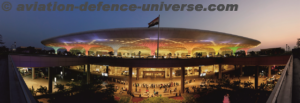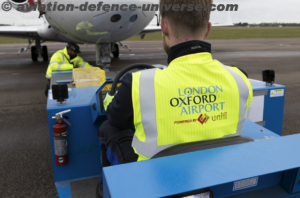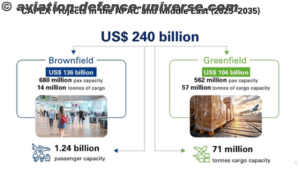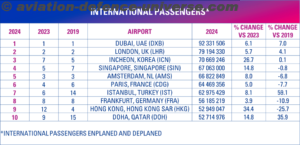New Delhi. 13 March 2020. On behalf of Airports Council International (ACI) Asia-Pacific, I wish you and your colleagues well at the Ministry of Civil Aviation (MoCA).
In representation of 113 airport operators managing 602 airports in 49 countries of the AsiaPacific and the Middle East Regions, our mission is to promote professional excellence in airport management and operations through a range of capacity-building services, policies and recommended practices.
We would like to draw your attention to the importance of considering appropriate measures to address the growing severity of the Coronavirus (COVID-19) outbreak and ensure sustainability of operations for airport operators.
COVID-19 has drastically impacted the airport business and is posing a serious threat to the financial sustainability of the airport industry in the most affected countries of the Asia-Pacific Region. According to ACI World estimates, Asia-Pacific is suffering the highest impact, with passenger traffic volumes down -24% for the first quarter of 2020, compared to forecasted traffic levels without COVID-19. Within the Asia-Pacific region, mainland China, the Republic of Korea and Hong Kong SAR remain at the centre of the effects with sizable losses in traffic volumes. The decrease in traffic in these countries/ territories has been well above the regional average drop, peaking in February even beyond the -50% at some hubs. Preliminary estimations are providing an increasingly challenging scenario in terms of passenger traffic in March.
Aeronautical revenues from airport charges paid by airlines and passengers against the use of airport facilities and services are instrumental to recover operating expenses – critical to ensure airport operations and service quality – as well as the large capital costs incurred by airports. But aeronautical revenues alone are not sufficient to recover the cost base for airport facilities and services. Commercial revenues play a key role to bridge the gap between airport costs and aeronautical revenues.
Both these revenue streams are under serious threat. The shortfall in the number of passengers and the cancellation of flights leads to reduced revenues from airport charges (landing charge and parking charges paid by airlines for instance, and passenger service charges and security charges paid by passengers). Non-aeronautical revenues, which usually serve as an additional cushion during economic downturns, are not able to play that role in the COVID-19 outbreak context. Passenger traffic from China and Eastern Asia tends to generate comparatively high revenue for retail concessions and other non-aeronautical services, but this typology of traffic is the most affected by the outbreak and seriously challenges the ability of airports to continue generating much-needed non-aeronautical revenue from their commercial activities. According to our estimation, the impact of COVID19 is projected to have a revenue loss of US$3 billion in Q1 2020. This loss, which is estimated within a conservative scenario should be understood in light of the full year total revenue of US$ 57 billion generated by airports in Asia-Pacific in the year 2018.
While the airport industry is fully cognizant of the dramatic situation experienced by our airline partners, we are equally impacted by the COVID-19 outbreak. The financial sustainability of the airport industry is under threat as well. Reduced passenger traffic has adversely impacted the aeronautical and non-aeronautical revenues for airports due to less sales at F&B and retail outlets. As such, alleviating the collection of airport charges from airlines and passengers through suspending the collection of charges or granting blanket discounts is not conceivable. These charges, in any case, represent a relatively small share of the airline cost base, compared to fuel prices, which comprise more than 40% of their costs. Fuel price, itself, has also come down significantly in the international market and has come as a boon for the airlines in such hour, while no such compensatory development is available to the airport.
The direct pressure on airport operating expenditure would simply be unbearable to maintain current staffing and service levels. Airports must also continue to meet their capital expenses obligations as they remain characterized by predominantly high fixed costs necessary for maintaining and operating the infrastructure components of the airport, such as runways, taxiways, aprons, parking stands and terminal buildings. Unlike aircraft, these are not movable assets.
Consequently, airports must continue to be able to collect both aeronautical and nonaeronautical revenues from their users and end-users. Making requests to alleviate the collection of airport charges in the context of the COVID-19 outbreak is ill-advised and incognizant of the fragile financial sustainability of airport operators.
In consideration of the above we recommend that alternative relief measures should be explored to support both the airlines and the airport industries as primary generator of economic and social value for the country. In particular we would like you to consider the following:
1) Reduce airport taxes applied on a per passenger basis, that by ICAO definition, are not related to the provision of airport services or to the financing of airport infrastructure development. This would also incentivise passenger confidence to travel. The reduction of airport charges, on the contrary, is not always passed through to passengers to reduce the price of the ticket.
2) Consider on a case-by-case basis to waive concession fees that the private airport operator has to correspond to the Government by concession agreement.
3) Explore similar relief measures for publicly owned airports to ensure a level playing field between airports operating in India.
In addition, we recommend a more pondered approach with respect to the airlines’ proposal to waive the 80/20 rule for the current Winter Season and the forthcoming Summer Season. We are sympathetic with the airlines’ needs to avoid flying empty airplanes simply to retain airport slots, for economic and environmental reasons. But this should not jeopardise the connectivity of passengers and distort the competitive field. Not all the markets are affected to the same extent by the COVID-19 and thus granting waivers in a targeted and proportionate way based on clear data and assessments should be considered at national level. Suspending the rule unilaterally also poses the risk of hindering a rapid recovery in demand, especially in countries that are demonstrating to manage the impact of the COVID-19.
We are in consultation with IATA and the Coordinators to also explore solutions at global level. Possible measures to be considered include:
1) a relaxation of the 80/20 rule to a lower threshold; or
2) a calculation of the historic rights for airlines based on a shorter period, as applied in some other aviation markets are worth it further analysis in the coming weeks
We would also like to stress that for any waiver, whether general or targeted, airlines should be required to return slot that they will not be using to the pool at a set date to allow their effective reallocation to other airlines.
Thank you for taking the time to consider ACI’s views above and we look forward to hearing from you and remain at your disposal for any clarification you may have.































































































































